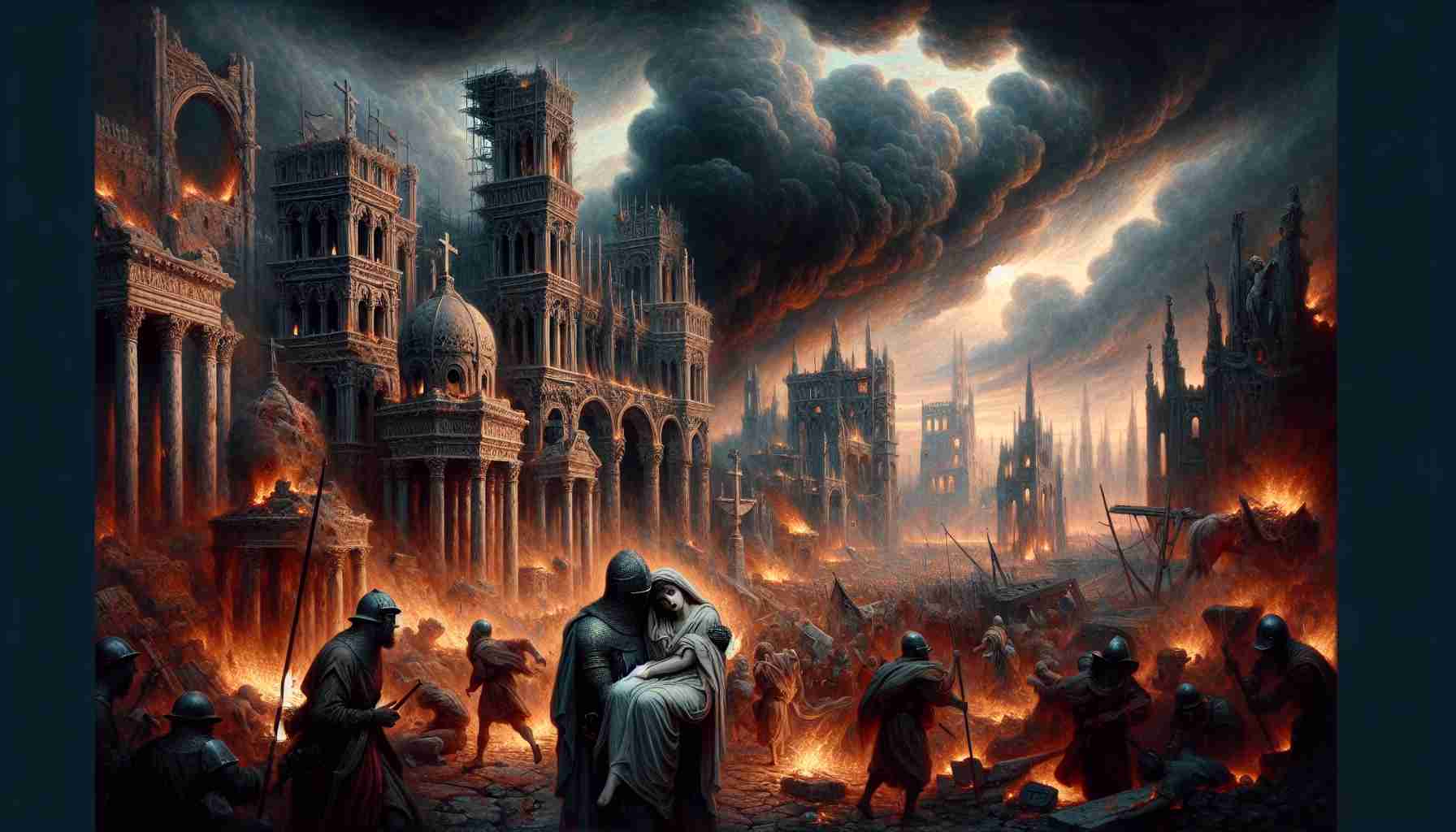

The ash sky above Acre twisted as smoke billowed from its crumbled towers. Catapults flung stone and fire against the age-worn walls, while arrows hissed through the air like serpents. Beneath the battlements, a Knight Hospitaller stood rigid, blood caking the rim of his dented helm. Brother Renault had fought since dawn—his sword dulled against chainmail and bone—but the banner of the Cross above Saint-Jean d’Acre now drooped, torn, mocking the once-proud guardians of Christendom’s frontiers.
The Mamluk drums thundered like an approaching storm. Each beat echoed the fall of another bastion. The sea, once the Crusaders’ artery to the West, reflected flames now. Smoke veiled the streets where beggars had once prayed and merchants from Venice bartered spices under tiled eaves. Now they screamed.
Renault staggered through the Temple District, past the half-shattered Church of Saint Andrew. Stone angels lay wingless at its doorstep, their faces buried in dust. Not long ago, priests whispered Latin prayers at dawn, their voices rising with incense. But this morning, silence took the place of sanctity, interrupted only by the crash of splintering doorways and the cries of the dying.
By the gardens behind the church, a boy crouched, trembling. Barefoot, forgotten. Renault dropped to one knee. With gauntleted hands, he pulled the child close, shielding him beneath his cloak. The boy smelled of soot and fear, but he clutched something tightly—clay, crudely carved. A cross.
A javelin struck the ground yards from them. Renault flinched. The time had come.
At the harbor, chaos reigned. Half-burned ships listed in shallow waters where Templar knights had once arrived in grandeur. Women wailed. Men fought one another for space aboard narrow decks. Among the vessels remained the Saint Helena, battered but afloat. If it left soon, it might outrun the fire.
Renault handed the boy to a weeping widow wrapped in a singed veil. She gave no name. None were needed. The child stared back over her shoulder as the knight turned away.
The final tower at the sea wall shuddered and collapsed in a bloom of dust. Above it, the Mamluk standard rose—a white crescent slashed over green cloth. Acre, the final bulwark of Christian power in the Levant, was theirs.
Behind Renault, a Dominican friar emerged from the ruins of a cloister—his robes blackened, his crucifix swinging on a frayed cord. “Jerusalem was never ours,” he murmured, voice hoarse from ash. “Not truly. The Kingdom belongs to Heaven.” His grip on Scripture trembled, but his eyes did not.
Renault remembered words once spoken by a traveling preacher many winters ago in a cathedral lit by hundreds of candles: “I will build my church, and the gates of Hades will not overcome it” (Matthew 16:18). No stone wall had preserved that promise. Not sword nor charter. Yet here, in the overthrow, something ancient stirred—a truth unbound by fortresses.
As evening fell, fires kindled the sky in hues of orange and crimson. The city moaned—a mortally wounded thing. But far from the screams and iron, on distant shores, the Church still sang. In hidden chapels carved into catacombs, in village gatherings lit by oil, in whispered prayers across Europe, faith endured. Acre had fallen, yes. But not the kingdom foretold on Galilean hillsides.
Beneath the Temple Mount, now under Mamluk rule once more, some whispered that the Crusaders had never fully understood what they sought. They spoke of pilgrims whose sandals touched holy ground, but whose hearts never bowed. Tales sprang up in Cairo and Damascus—of dreams had by soldiers: a carpenter's son from Nazareth standing silent among broken battlements, His eyes brighter than fire, His hands bearing neither sword nor scroll. He wept. Not for the city, but for men who thought they built God’s reign through conquest.
History would remember Acre as the final stand, the severing of Christendom’s sword from the Holy Land. But through the rubble, something eternal had begun to grow. Not a kingdom of marble, but of mercy. One not defended by battalions, but borne in broken hands offering grace.
Brother Renault did not escape. Neither did the friar. They fell before dawn beside the steps of Saint Andrew’s, defending no treasure but dignity. Days later, a child cradled his clay cross somewhere along a Genoan coast, staring across waters to the east, where dreams of empires had faded.
What did Acre teach the church? That no wall, however hallowed, could protect the soul. That thrones fall and banners burn—but the church Christ built endures, not of stones, but of hearts reborn. In defeat, it found its purpose anew—not along blood-soaked coasts, but in lives redeemed far from battlefields.
From scorched ruins, a kingdom emerged—not of this world, but promised long before: a kingdom of love, truth, and unshakeable peace.